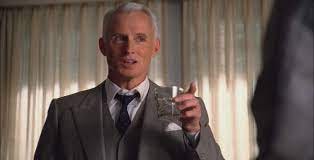When it was on TV I didn’t watch even one episode of Mad Men, but was aware of it and knew a lot of people thought it was great, so I recently got curious and bored – a combination that will consistently get you in trouble – and checked out the DVDs from the local library and now that I’ve watched all of it, consider Mad Men a really well done soap opera.
You keep watching because you want to find out what happens next.
And my favorite character by far is Roger Sterling because at this stage of my life I totally relate to an over-the-hill guy who doesn’t work that hard, drinks too much and seems to focus most of his efforts on saying smartass stuff in meetings.
Just in case you watched the video and were appalled: I believe some guys liked Mad Men because they enjoyed watching other men say sexist, racist and homophobic shit, smoke and drink at work, wear blackface at parties, hit on their secretaries and not get in trouble for any of it. (If you’re a Republican Male, AKA: “The good old days”).
And now…
Some valuable advice about meetings and smartass comments
One of my many career problems was the inability to pass up the opportunity to drop a one-liner in meetings that were so boring you’d rather be in church listening to a Catholic mass in the original Latin performed by an 83-year-old priest with a speech impediment and dementia.
And while my one-liners seemed to make everybody laugh, in retrospect I'm pretty sure the people running those meetings didn’t appreciate the humor.
Like the time we had an all-day meeting to come up with our goals for the coming year and wrote down meaningless bullshit words like “communicate” and “expand our bandwidth” then argued what exact order the meaningless bullshit words should be listed in and when we had to do the exact same exercise the following year I said:
“Why don’t we turn in last year’s list again because we didn’t do any of that shit.”
Making a list and turning it in allowed some management type to put it on their list of accomplishments which was the real point of the exercise and more important than actually doing anything differently because once the list was turned in we never talked about it again.
Or the time I came into the editorial board room and all the pictures of former publishers were gone and when I asked why, was told it was a bad image for guests because all the former publishers were White Males, to which I said:
“If we think having White Male Publishers looks bad, why did we just appoint another one?”
Or the time we were discussing how the internet and “click bait” (less than newsworthy stories that would get people to click on them, like “Lady Gaga’s outfit shocks red carpet” or “Bear enjoys hot tub”) was ruining the newspaper industry and I said:
“I feel like I’m making fine Italian loafers and the whole world’s wearing flip-flops.”
Apparently someone in that meeting used my line in another meeting and I was subsequently called into an editor’s office and informed he didn’t need to hear any more overly-accurate Lee Judge lines.
It was like being a Court Jester and making all the Lords and Ladies laugh with a great one-liner about the King, and the King (who pretended to find it funny at the time so he wouldn’t look like a humorless asshole) later calling you in to ask where you want your head sent once the Royal Executioner separates it from your shoulders.
So if at all possible, keep those great one-liners to yourself because while we look down on suck ups, ass-kissers and brown-nosers, guess who survives in the great game of Corporate Dodge Ball.
And now for some really shitty business advice
The Mad Men DVDs came with extras and one of the extras was a documentary explaining “How to Succeed Like Don Draper” which is a pretty dubious goal because Don’s a raging alcoholic who gets hammered at work and tries to bang every woman he meets and succeeds about 97% of the time which in my personal experience puts Mad Men into the science fiction category, but that’s a totally different essay.
The documentary featured “business experts” and after listening to them for 15 minutes I wanted to put my foot through the TV screen because their advice was horrible and I’ve seen how their Bad Business Advice plays out in the Real World.
And we’ll start with…
Set your goals really high because nothing is impossible
I wanted to take the “business expert” who said nothing is impossible to the top of a high building and shove her off while telling her she had nothing to worry about because if she tried really really really hard, maybe she could fly.
After all, nothing is impossible.
In the Real World all kinds of stuff is impossible, but management people like to pretend otherwise because then they can set employee goals unrealistically high which means their employees are always failing and feeling bad about themselves, which has the management-friendly benefit of insecure employees not asking for raises or feeling comfortable making smartass remarks about Italian loafers and White Male Publishers.
Unrealistic goals don’t always make people try harder; unrealistic goals eventually make people give up.
Don’t rest on your recent success, always ask what’s next
In the Real World this is known as “moving the goalposts” so every time an employee thinks they’ve scored a touchdown and gets ready to spike the ball, management informs them that the goalposts have been moved when they weren’t looking and they’re actually still on the 5-yard line. If you want your employees to feel inadequate and insecure, make sure they never have a sense of accomplishment.
If they win an award, say you expect them to win it every year or if they hit a goal, tell them the goal has been changed and they’re still coming up short and I could go on, but I couldn’t stand to listen to any more Bad Business Advice from “business experts” and turned off the documentary.
It seems like…
Some businesses want their employees to always feel like they’re failing and coming up short and should be grateful for whatever financial crumbs management lets fall off the management dining table which is a really great way to make your employees feel unappreciated and start looking for a different job.
As I recently said elsewhere: “If you won’t pet your dog, don’t be surprised if he winds up on someone else’s porch.”
(BTW: Everything I just said about business also applies to personal relationships, so think about that for a while.)
The Fail-Fast Philosophy
Like any other field there are fads in business management and one that I had explained to me was the Fail-Fast Philosophy which – when translated into English – means try a lot of different things and discard the ones that don’t pay off immediately.
A business philosophy that takes management off the hook for deciding which things are worth trying and which things should be abandoned and which things are worth sticking with because they’ll pay off in the long run, but it’s a popular approach because the real goal of far too many managers is avoiding responsibility.
But if you abandon things that don’t pay off immediately we wouldn’t have Seinfeld, Post-It Notes, bubble wrap, YouTube, the light bulb, the telephone, computers, victory in WW2, a vaccine for COVID or anything else that took a while to develop.
Still not having learned my lesson about humorous, but career-damaging one-liners, when a member of management explained the Fail-Fast Philosophy to me, I said:
“The word that’s jumping out at me is ‘fail’.”
Do people want recognition more than money?
Almost forgot: one of the “business experts” told a story (which is an accurate description because I’m pretty sure he pulled the “story” directly out of his ass) about a manager who offered a $5,000 bonus to whichever salesperson had the best month, but the salesperson who won the prize didn’t act all that excited and when the manager asked why, the salesperson said instead of $5,000 he’d rather have the manager acknowledge him in front of the staff.
Riiiiiight.
On what fucking planet would a salesperson rather have a pat on the back than $5,000?
This is the kind of bullshit anecdote that “business experts” dispense at management seminars which convinces your boss it’s OK for him to reward himself with a yearly bonus while rewarding you with your name on a shitty “EMPLOYEE OF THE MONTH” plaque, which reminds me, at one point in my journalistic career I was called to HR to be handed a piece of paper in a plastic frame celebrating my years of service and meanwhile the head of HR that handed it to me was arriving at work in a brand new Mercedes.
As one friend said of his longtime place of unemployment:
“They not only want you to eat a shit sandwich, they want you to tell them it tastes good.”
Don’t Be Like Don Draper
I could go on and often do, but here’s what I know about leadership.
In 1990 I started playing baseball in a men’s league and based on being the worst player on the team, got asked to manage and having never been in charge of anything or anybody because I always wanted to have the same relationship with my place of employment that Key West has with the rest of the United States (connected by a long bridge that few people go to the trouble to travel). So having no experience I asked Big League managers and coaches about leadership and here’s what their advice came down to:
There is only one kind of real leadership – leadership by example.
If the workers stay late, you stay late.
If they don’t get a bonus, you don’t get a bonus.
If they don’t get a pay raise, you don’t get a pay raise.
One night in Canton, Ohio I was watching former Kansas City Royal Clint Hurdle’s minor league team and it was freezing ass with wind and rain that was about two degrees short of turning into snow, but Clint was coaching third base in his shirt sleeves.
After the game I asked why he wasn’t wearing a jacket because I was going to the gift shop every two innings to buy more Canton-Akron Indians apparel in an attempt to stay warm and Clint said:
“If the players are cold, I’m cold.”
In five words and one sentence Clint taught me the most important thing I needed to know about leadership; lead by example.
P.S.
And don’t be funny in meetings.













Man. You hit some buttons here. If you're over the hill I'm at the bottom about to go over the cliff. In 1960 while watching the Dem convention on TV with my family, cameras showed Eleanor Roosevelt digging in her purse. My dad asked the rhetorical question, "what's she looking for"? I answered "a sandwich". My family cracked up. That's when I learned I'm a wise ass. It hasn't gotten me anywhere but I wasnt going anywhere anyway.
So our big boss (CEO or something) was in town for the first time ever this week. Fortunately I was happily working from home and didn't have to attend the impromptu town hall he held. Homeboy apparently was tone deaf enough to stand in front of his worker bees complaining about how much his daughter's Paris wedding is costing him. Then he moved on to talk about how he lost a $10,000 personal bet on the Chiefs back in Super Bowl LV, because you know that's what we care about - that you and your buddy can drop a $10k bet between yourselves. And he compounded it by saying something to the effect of "I wanted to cry when I lost but I'm a man so I can't cry. If I was a woman I could cry." Tell me you're a rich white misogynist without telling me you're a rich white misogynist...